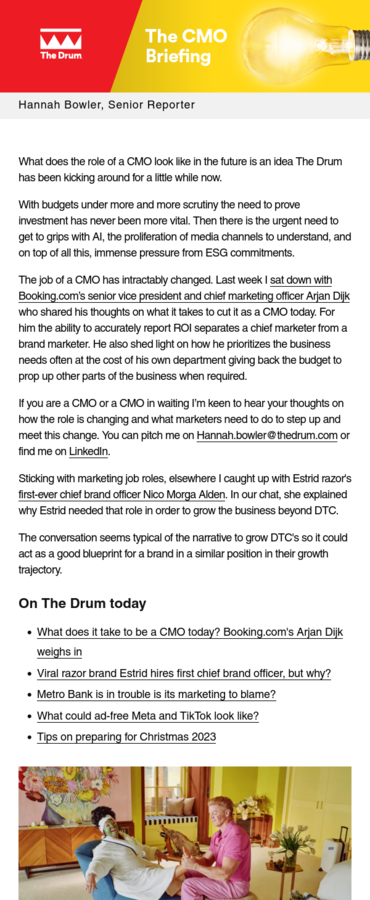Top Chicago agency leaders on what’s most critical for agency profitability in 2023
The Drum Network, in partnership with Scoro, assembled more than a dozen top agency leaders in Chicago last month to discuss how to run a profitable agency in 2023. Here are the top insights they shared.

Several leaders said ‘transparency’ was a key factor in an agency’s overall success / Credit: Adobe Stock
1. Adapt to meet new client demands
Jeff Berg, president, Abelson Taylor
Clients are younger now, which means senior leaders will have to educate them on their offerings. “What’s changed is ... there’s been a lot of turnover. There are a lot of junior clients, and they don’t really understand marketing as well as we would like ... We’re talking some basic marketing things. Not that these aren’t smart people. They’re just inexperienced in some cases, and they’re new. So we’ve got to convince them that we are providing this value.”
James Meyers, chief executive officer, Imagination
Despite this influx of new clients, existent relationships with older clients must remain important. “We all love the new client, we love the chase and we love that thrill ... [However] how much business can you take on with new clients without stealing from your existing clients? ... We’ve seen growth from our existing clients because they trust us, because we have a relationship with them that they count on ... If you’re constantly chasing new business and trying to onboard new things, particularly in the talent situation that we’re all in, you end up stripping away talent from your existing clients.”
Advertisement
2. Recognize that timetables and budgets for campaigns are tightening
Robert Murray, chief executive officer, 3Q/Dept
Marketers are becoming more privy to a faster-moving world. With it comes a shortening of marketing strategies overall. “There is a bit of nervousness that you see within clients. They’re not planning long-term; they’re planning short-term. And then they say they want you to drop drive their growth and the challenge is, well, sometimes you’re going to have to start exploring into areas you haven’t before.”
Anthony Riley, president and chief executive officer, MxGroup
Agencies must adapt in order to meet the new expectations of clients. “The change of pace has been so quick that we had to expand our partnership model. We’re an independent agency. We can’t build or become great at a lot of things really quickly ... [Therefore] we partner with agencies, a lot of them, based on their specific competencies.”
Advertisement
Chris Kimbrell, vice-president and client manager, Jellyfish
Global economic pressures also crunch timetables. “Clients are typing their goals. Interest rates are going up. Every investment they make needs to have an immediate return. The way to think about that is ... how you structure teams. We’re more focused on globalization or offerings and sort of breaking down the barriers ... And we have that flexibility of resource allocation. It allows you to make some smart choices in terms of options that you begin applying that don’t always need to increase costs.”
Kevin O’Connor, head of sales, Americas, Scoro
As budgets tighten, profitability at every step of the creative process will matter. “What I’m hearing a lot of is a more and more pressing need [for] real-time transparency into what’s happening around profitability ... Because of the need to deliver more value on every project with every client ... [We] need to understand the profitability margin in as real-time as we can get.”
Colin Lange, general manager of the Midwest, Landor & Fitch
Digital advertising will continue to evolve and dominate the industry. “We’ve been on a transformational journey for a while, although the pandemic was a huge accelerant, as it was for many people ... Digital transformation is a huge part of that: our ability to adapt systems and processes allows us to understand, and get that transparency and decision-making down.”
3. Prioritize your humanity to identify your agency’s purpose
Matt Pensinger, executive vice-president and managing director, Jack Morton Worldwide
“It’s about giving people an understanding of purpose. What are we trying to do? Why are we here? What’s the end game? Being able to be transparent and in giving them visibility ... so they feel connected and engaged ... Being able to support them with training and counsel on a regular basis so that they can really work off of both the vision and then the playbook for the specific work that they’re attached to.”
Allison Cirullo, chief operating officer of global brands, Edelman
All brands, no matter the industry, can be an agent for positive change. “Our clients and our brands – whether it’s B2B or B2C – have a massive opportunity to make change right now, and change is needed. There are so many issues; there are so many problems. The biggest thing we can help our clients see is not just how they market, but how they actually take action on things. They’re going to help society. They’re going to help the world. They’re going to help make changes because, if brands and companies don’t stand up to do some of these things that we’re challenged with right now, I think we’re going to have a big problem.”
Suggested newsletters for you
Courtney Miller, executive vice-president and head of strategy, Edelman
By and large, brands are taking on an advocate role for consumers – and it’s important that they embody those roles through a pertinent purpose or cause. “People don’t trust governments to be able to do the things that they’re set out to do – and so they’re really looking to brands to close that gap ... Give the brand a purpose. Give the brands something to solve that people can actually get behind.”
4. In today’s changing work environments, you must keep employees engaged and informed
Kelly Graves, president, FCB Chicago
Encouraging employee engagement in a range of work environments – be it hybrid, remote or in-office – is increasingly difficult. Most leaders agreed that a mix of transparent communication and personal involvement is key. “People still want to feel like they’re a part of something. I don’t care if it’s a hybrid day, if they’re working from home or if it’s an in-office day – they want to feel like they’re a part of something ... A big piece of that is spending time together and doing things in person.”
Chip LaFleur, president, LaFleur Marketing
Starting with a hands-on training approach with talent, and then giving them the freedom to create, helps them become more connected to the work. “We’ve restructured our entire organization to create more clients and our teams ... to train all of the people on the frontlines ... to effectively make decisions ... At the agency level, we serve more as advisors, and so we help solve problems, but we give people the tools and the data and the information they need to be able to make decisions ... We let them run it.”
5. Be mindful of where your talent is at mentally
Tim Condon, chief executive officer, Schafer Condon Carter
Following the pandemic, employers must consider the changing sentiments that people have about work. “We’ve embraced the remote side of the business ... the only way that we’re able to communicate with our full staff is with an email. That is the only thing that’s going to reach everyone ... You’re kind of dealing with a freelance mentality that could go anywhere at any time. Your brand as an employer has to be strong enough, and attractive enough, to keep them there. It’s kind of a new era.”
Brian Hurley, president, Schafer Condon Carter
Mental health continues to be an important factor in a healthy workplace. “We just have to be decent and kind, understand that everyone is still going through whatever they’re going through ... The veil has kind of been taken away and we need to be more transparent. We need to be more human to each other.”
Elizabeth Harris, chief strategy officer, Arc Worldwide
Investing in mental health and flexible work schedules will have fruitful outcomes on business. “Ideas come from healthy, creative brains, so I think focusing on our people, whether it be inclusion, mental health, all of the things that we need to do to support those amazing tools that do amazing creative work every day ... should be our number one focus.”
To find out how to join The Drum Network, visit thedrum.com/network.


